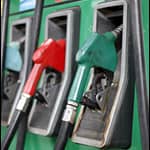 Driving is definitely more expensive this year as gas prices just keep rising.
Driving is definitely more expensive this year as gas prices just keep rising.
Gas prices are up over 11% for the year and have now increased for 32 consecutive days — from a national average of $3.38 on January 26 to $3.71 Tuesday.
Today’s retail gas price is 13 cents more expensive than one week ago, 29 cents more expensive than one month ago, and 35 cents more expensive than one year ago, according to AAA.
Today’s record-high gas prices are having a real impact on millions of families and businesses who rely heavily on their cars. Drivers in three states currently pay an average of more than $4.00 per gallon: Hawaii – $4.32, California – $4.29, and Alaska – $4.09. Only two states currently pay less than $3.20: Wyoming – $3.12 and Colorado – $3.14.
Gas prices are expected to rise even further in 2012. Here in California, many drivers are bracing for $5 a gallon gas this summer.
The winter surge is being driven primarily by the rising price of oil, which has been above $100 a barrel since Feb. 10 as tensions mount between the West and Iran over its nuclear ambitions.
Despite only four trading days due to the Presidents’ Day holiday, last week’s increase in crude prices was the third largest since the start of 2009 and the largest since the first week of March 2011, when prices surged above $100 per barrel for the first time since 2008.
The price increase last March was driven by violence in Libya, as rebel forces clashed with those loyal to then-leader Muammar Qaddafi, and concerns persisted that this unrest would spread to other countries in the region.
Despite reports of anemic demand, gas prices continue to rise.
Weekly Department of Energy numbers last week showed a slight rebound and a new high for 2012 at 8.628 million barrels of gasoline consumed per day. This number is still some 500,000 barrels below consumption for the same week in 2011, and a look at the more telling 4-week average shows a more than 6% year-over-year decline.
If your family or your business has been affected by this year’s rising gas prices, then you may want to consider purchasing a GPS fleet tracking system. A fleet GPS tracking system can provide an ROI in less than six months and immediately reduce fuel consumption.
In today’s tough economic climate, profit margins are slim and companies must implement as many cost-saving initiatives as possible. In order to stay competitive, companies have to look very closely at every penny spent. Utilizing a GPS fleet tracking system can be one of the most cost effective means to manage and reduce fuel consumption. A GPS fleet tracking system can help the average fleet reduce fuel costs by up to 20%.